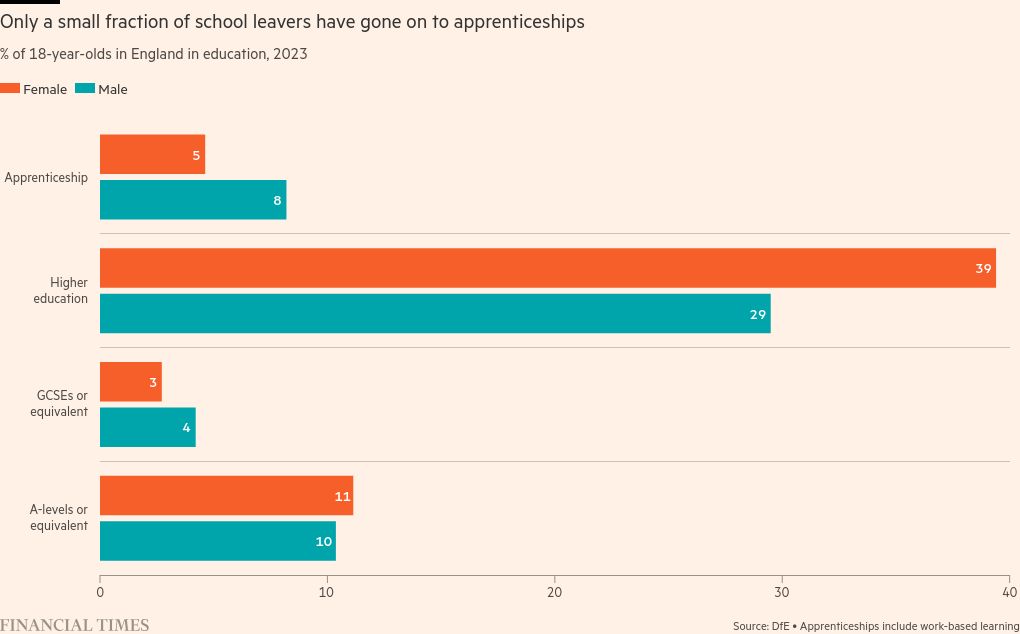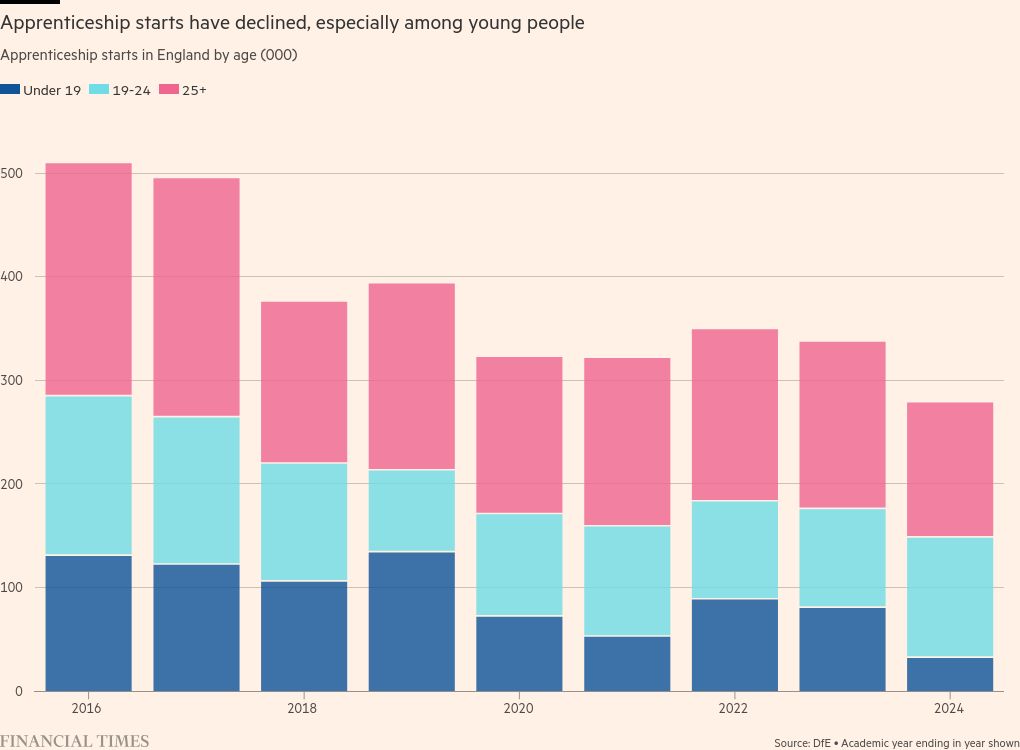
For 20-year-old Jamie Clarke, the chance to study at the UK’s top-flight Manufacturing Technology Centre in Coventry made reality of a dream that began as a boy, when his grandfather taught him how to make electrical circuits for remote control model cars.
After leaving college at 18, Clarke used that experience to help get selected for an apprenticeship with French-owned LISI Aerospace, a company in nearby Rugby that makes precision components for the aviation industry.
“I never considered university. I don’t like being sat in an office, I like to get my hands dirty,” said Clarke, whose mother was a communications officer in the Royal Navy and father is a patternmaker, including for Formula One racing.
But Clarke’s gold standard, on-the-job training is available to far too few young people, according to the manufacturer’s organisation Make UK, thanks to years of chronic under-investment and failing skills policy.
The UK’s new Labour government is promising to radically change the skills and training landscape but has a mountain to climb after a decade in which training for entry-level apprentices declined across the board.

Between 2015 and 2024 the total number of apprenticeship starts fell by 45 per cent. The biggest decline was among young people with the number of under-25s starting apprenticeships falling 48 per cent to 149,000 over the same period, according to government data.
The number of engineering apprenticeship starts has dropped by 42 per cent since 2017 despite the previous Conservative government introducing an 0.5 per cent apprenticeship levy on businesses with salary bills of £3mn or more.

Budget choices
As chancellor Rachel Reeves prepares to deliver her budget on October 30, organisations such as Make UK and the Association of Colleges, the body that represents further education institutions that deliver many apprenticeships, want resources to be better focused on the sector.
Make UK chief executive Stephen Phipson said the primary reason for the collapse in engineering apprenticeships was the government’s failure to fund them at a level that made them economic for colleges and private training companies to deliver.
According to Make UK’s submission to the Treasury ahead of the Budget, government funding for a Level 3 (equivalent to A-level standard) apprenticeship in engineering is capped at £27,000 when they cost £36,000 a year to deliver.
“The new government has committed to building a talent pipeline but this cannot happen with the current funding arrangements which are leading many training providers to simply walk away because it is basically uneconomic,” Phipson said.
Make UK said it was not asking for more money, but was instead urging Reeves to concentrate existing levy resources better, in order to fully finance the apprenticeship standards that support its “industrial strategy”.
However. there is strong competition from other sectors for limited resources, according to Tim Smith, a former government policy adviser who is now corporate affairs director with apprenticeship provider Multiverse.
“One problem is there isn’t consensus around what matters,” he said. “The government also has other missions around the tech economy, healthcare and green skills that also link in to its industrial strategy.”

Reforming the levy
Sir Keir Starmer’s new Labour government has promised to remedy the failings of the existing levy by introducing a new “growth and skills levy” that will allow businesses more flexibility in the way they spend their contributions.
Industry is still awaiting details of how the new system will operate. A new body, Skills England, is consulting on how to reorder the training landscape as part of Labour’s overall industrial strategy, an early blueprint for which is promised at this month’s Budget.
Mark Capell, the managing director of LISI Aerospace, a company with 330 staff that has 23 apprentices, said any flexibility that helped it spend the levy more effectively would be welcome. The company currently only spends 45 per cent of what it pays in the levy — despite being heavily invested in the apprentices like Jamie Clarke.

Cappell said the company preferred training apprentices to hiring graduates because they were more likely to stay with the business when training was complete, but the current system was just proving too bureaucratic for many providers.
“We’ve found that a lot of training providers that were around three or four years ago are no longer there. It’s no longer feasible to provide an accredited apprenticeship course, the bureaucracy is too difficult,” he added.
David Grailey, the chief executive of the MTC in Coventry, which was founded in 2010 as part of a network of research centres to support high-value manufacturing, said the centre’s provision was only made possible by £1mn in annual sponsorship from Lloyds Bank.
He added that the government needed to take steps to increase financial support for post-16 apprenticeships, in order to increase uptake among training providers.
In an apparent tilt in that direction, Starmer said at Labour’s party conference last month that the government would introduce new “foundation apprenticeships” that he said would “rebalance funding in our training system back to young people”.
As part of this, the government will also reduce or remove funding for many “Level 7” apprenticeships, which are equivalent to a masters degree, so that funds can be directed at earlier levels.
However, as well as targeting more entry-level apprenticeships, the government should also consider steps to increase the overall size of the pot, according to David Hughes, head of the Association of Colleges.
Total revenue from the levy is forecast to grow from £3.9bn to £4.6bn by 2029 as rising wage bills drag more businesses across the £3mn threshold to pay the levy, but adjusted for inflation that will still only represent an 8 per cent increase in real terms over that period.
“Employers in the UK spend less on their workforce than OECD countries and the levy, at 0.5 per cent, is quite low by international standards, there’s an argument it needs to increase in coming years,” Hughes added.